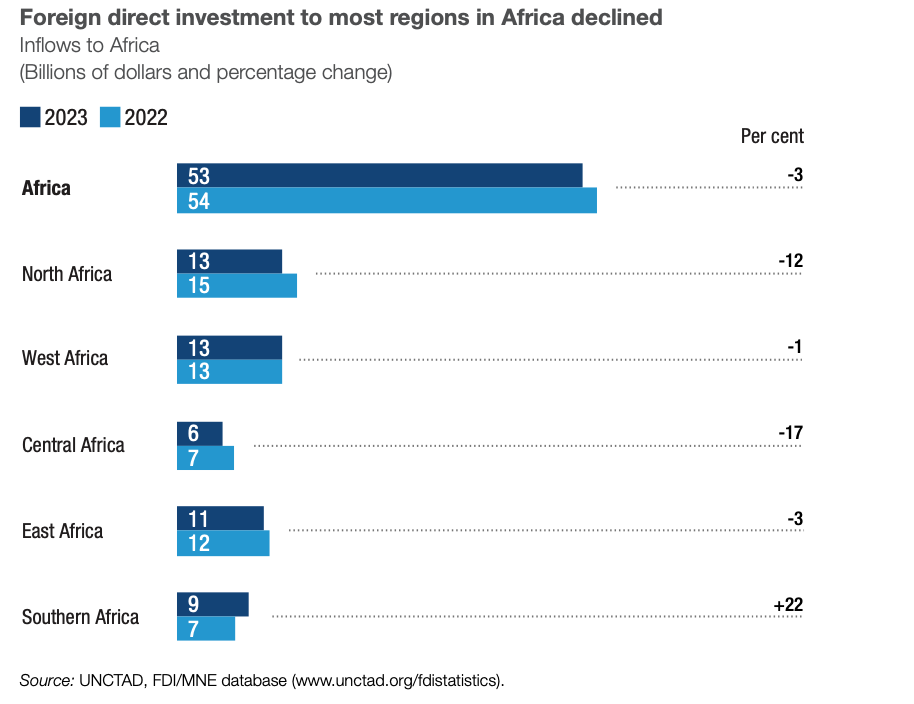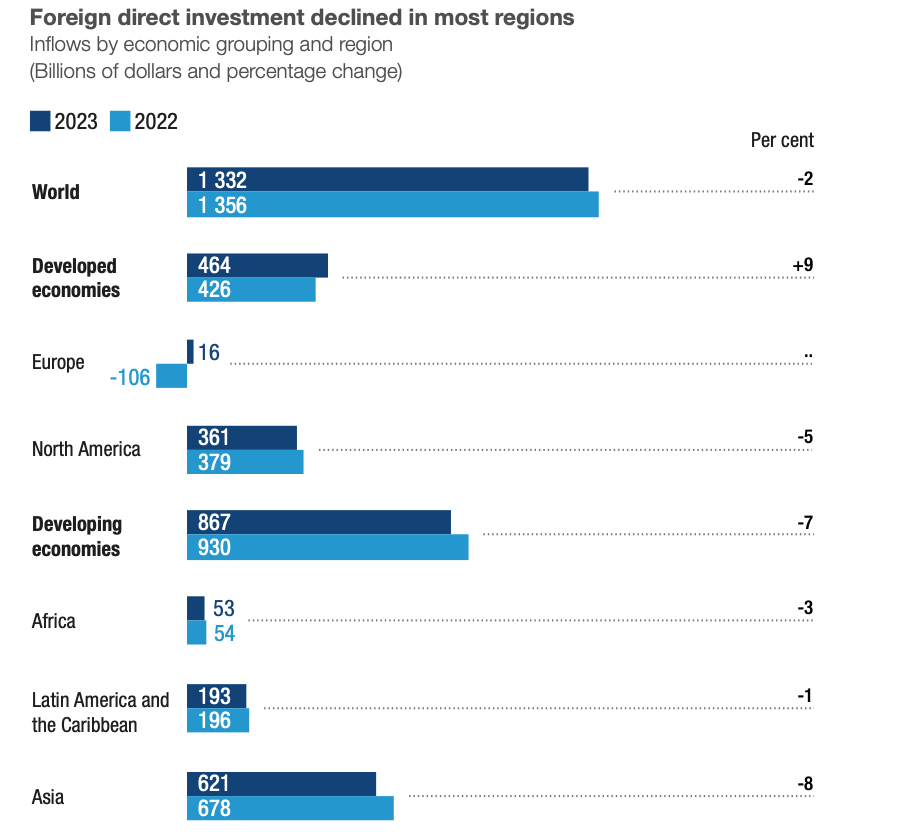Africa and Nigeria saw mixed outcomes in 2023 amid a slight global decline in foreign direct investment (FDI).
Africa’s FDI inflows dropped by 3% to $53 billion, while Nigeria and other African countries experienced a varied landscape of investment activities.
These is according to the World Investment Report 2024 prepared by a team at the United Nations Conference on Trade and Development (UNCTAD).
Despite the overall decline, the number of greenfield projects in Africa rose by 7%, with over 800 projects announced.
These projects have the potential to generate an additional 200,000 jobs across the continent.
What the data is saying
According to the report, Nigeria attracted $1.87 billion in FDI in 2023 up from $895 million in 2022 but down from $3.3 billion. Latest data from the National Bureau of Statistics reported Nigeria generated $3.9 billion in 2023 out of which just $377 million.
In Nigeria, the government’s focus on attracting greenfield investments, especially in renewable energy, bore some fruit. The country introduced new fiscal and non-fiscal incentives aimed at encouraging investments in renewable energy.
This move aligns with similar initiatives in Italy and South Africa, which also adopted measures to boost renewable energy investments.
- Nigeria’s investment landscape was marked by significant green hydrogen projects, such as the $34 billion green hydrogen project in Mauritania and green ammonia and hydrogen projects in Egypt worth $10.8 billion.
- These projects underscore Africa’s growing share of global megaprojects in the renewable energy sector. Additionally, three energy producers announced green hydrogen projects in South Africa totaling $7.1 billion, while Morocco attracted substantial investments in the same sector.
- However, the value of greenfield projects announced in Africa fell to $175 billion from $196 billion in 2022. The most significant year-to-year increases in project value were seen in chemicals, rising to $13 billion, and electronics, reaching $7.6 billion.
- Conversely, project values for electricity and gas supply projects dropped by $33 billion compared to 2022, contributing significantly to the overall decline in greenfield values.
The African Continental Free Trade Agreement (AfCFTA) Investment Protocol, adopted in 2023, is expected to contribute to growing intraregional FDI.
The share of intraregional projects is higher in services and selected manufacturing industries, with 20% of projects by African investors, than in resource-based processing industries, with only 13% of projects originating from the region.
- This indicates a substantial pool of investors within the region for some sectors and an opportunity to expand intraregional investment in processing industries to increase value addition.
- Despite the decline in FDI inflows, Africa remains a significant destination for international project finance deals, although the estimated value of such deals fell by 50% in 2023 to $64 billion.
- Industries related to renewable energy and power generation registered large drops in both values and numbers. However, momentum continued in some parts of the sector.
For instance, an investor group announced a deal for green hydrogen production totaling $4 billion in Egypt, and another group planned a $2 billion hydrogen project in Morocco.
Additionally, Africa attracted $10.8 billion in project finance for wind and solar electricity production, with the largest projects located in Egypt, South Africa, and Zimbabwe.
Global Review
Globally, foreign direct investment decreased marginally by 2% to $1.3 trillion in 2023. This headline figure was affected by significant fluctuations in financial flows through a few European conduit economies. Excluding these conduits, global FDI flows were more than 10% lower than in 2022.
- The global environment for international investment remains challenging in 2024, with weakening growth prospects, economic fracturing, trade and geopolitical tensions, industrial policies, and supply chain diversification reshaping FDI patterns.
- These factors are causing multinational enterprises (MNEs) to adopt a cautious approach to overseas expansion.
- Despite these challenges, MNE profit levels remain high, financing conditions are easing, and an increase in greenfield project announcements in 2023 could positively impact FDI. Modest growth for the full year appears possible.
International project finance and cross-border mergers and acquisitions (M&As) were particularly weak in 2023. The value of M&As, which predominantly impact FDI in developed countries, fell by 46%. Project finance, crucial for infrastructure investment, dropped by 26%.
- Developed countries saw a strong impact from MNE financial transactions, partly due to moves to implement a minimum tax on the largest MNEs.
- FDI flows in Europe jumped from negative $106 billion in 2022 to positive $16 billion due to volatility in conduit economies.
- However, inflows to the rest of Europe were down 14%. Inflows in other developed countries also stagnated, with a 5% decline in North America and significant falls elsewhere.
- FDI flows to developing countries fell by 7% to $867 billion, mainly due to an 8% decrease in developing Asia. In Latin America and the Caribbean, FDI remained flat.
Despite these declines, the number of greenfield projects in developing countries increased by 15%, with values climbing by 20%. This partially offset declines in international project finance deals, which fell by 26% in number and 31% in value.
[Nairametrics]



